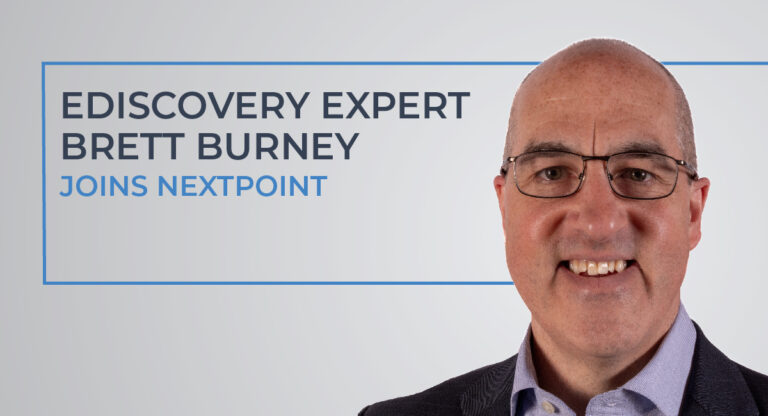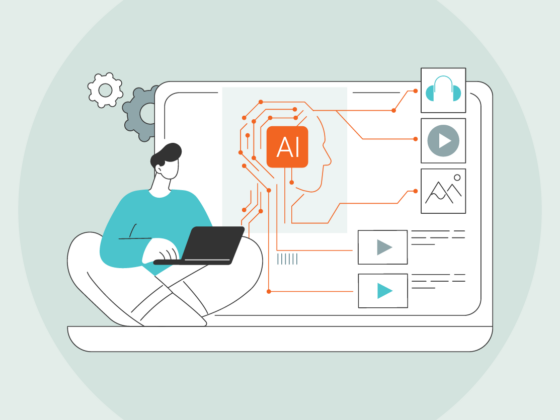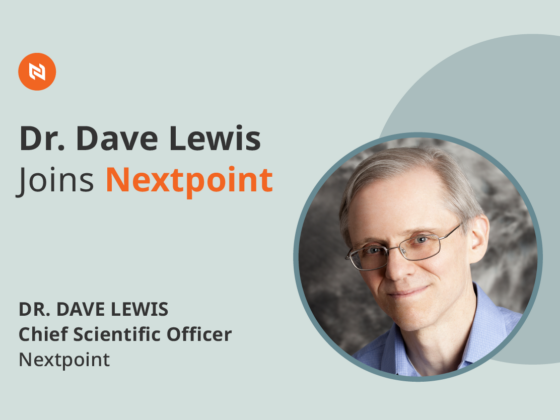Noted ediscovery consultant Brett Burney has joined Nextpoint’s team of legal experts as our eLaw Evangelist. With Brett, we will continue to spark new conversations in the ever-evolving field of legal tech and share our extensive legal knowledge and insights with all law-kind. Brett wrote one of the first reviews of Nextpoint software over 10 years ago, and we’re excited to collaborate now as thought leaders in the legal tech sphere.
Before founding his consulting practice, Brett supported lawyers at the law firm of Thompson Hine LLP, where he worked with litigation teams in building electronic document databases, counseling on ediscovery issues, and managing the technical responsibilities of presenting evidence at trial. Now, he helps corporations and firms of all sizes navigate ediscovery issues and minimize litigation costs by making smart decisions about legal technology.
We sat down with Brett to talk about his experiences and insights into the world of legal tech.
How did you first get involved with the legal tech industry?
BB: My identity as a tech nerd first blossomed when I coded in BASIC on my Radio Shack TRS-80 computer… and it never stopped. I went to law school knowing that technology was going to change the logistical aspects of practicing law (e.g. communications, invoicing, documents, etc.) as well as the substantive implications of law on society (e.g. e-commerce, digital music, the internet, etc.), and I wanted to experience it all.
My journey landed me at a large law firm where the CIO had a vision for someone that could help attorneys understand how to utilize technology better in their practice. I got to work on all kinds of projects including email migrations, mobile technology, real estate closing binders, financial tools, document automation, and a whole slew of other fun things. A huge portion of my responsibilities centered around ediscovery, which was a perfect fit for my background and experience.
When did you first hear about Nextpoint?
BB: I remember about 16 years ago meeting this guy called “Rocky” at a legal technology conference, and he was rambling on about something called “the cloud” and how it was going to revolutionize how lawyers worked. I’m positive I did not give Rocky the full credit he deserved at the time, but he was so persistent, and I made a note that he just might be onto something.
At that time, Nextpoint was mostly focused on trial technology. But a few years later, Nextpoint became one of the first cloud-based ediscovery document review platforms, and that’s when Rocky’s vision of the cloud started making sense to me. I closely followed the company from that point forward, and stayed in touch with Rocky and others at Nextpoint. It quickly became apparent to me that they were on a mission to “democratize discovery” for the vast majority of lawyers and law firms that needed access to ediscovery technology and tools.
How has legal technology changed since you entered the industry?
BB: It might be easier to ask what has NOT changed in legal technology! I’m no longer using cassette tapes to save my programs on my TRS-80 computer. I’m no longer building CD towers for storing documents in Summation. I’m no longer having to explain to attorneys how to use email. While the core skills for practicing law remain in place, technology has truly affected every nook and cranny of the practical, logistical aspects of a law practice.
There are now many other players in the cloud-based ediscovery space, and that’s really a confirmation of Rocky’s initial vision. In the world of ediscovery, we’ve (kind of) conquered the collection and review of email, as that remains the primary source of potentially relevant electronically stored information for litigation matters and investigations. And today, the biggest questions I get are about collecting text messages from mobile phones, social media, and Slack. Who knows what will come about in the next 3-5 years, but that’s what keeps it all exciting!
What are the biggest mistakes law firms make with legal tech, and how can they avoid them?
BB: First, legal experts and lawyers dismiss the significance of technology because they think it will replace their jobs, or they think they can do it better on their own. They don’t understand that technology is there to embellish their practice and make it more convenient for their clients. No one wants their accountant to do calculations in longhand when everyone knows a calculator makes their work easier, quicker, and more accurate. In a similar vein, clients prefer their lawyers use the appropriate technology tools to make their work more efficient and effective.
Second, law firms don’t like to invest time or money in technology. A $300 laptop might appear easier on the budget upfront, but it ultimately takes more time to get your work done and that laptop will conk out in 2-3 years so you’ll buy another one. Lawyers don’t like to attend training because there’s always something more important to do with their time. When you don’t properly learn how to use the tools, however, you end up spending MORE time accomplishing tasks manually, or you complain about missing features that actually already exist in the software.
As a legal expert, what issues and topics do you see emerging in the legal tech industry right now, and how do you expect them to progress?
BB: Well, apparently it takes a pandemic to force lawyers to wake up and notice the possibilities of technology! Haha. But seriously, it has truly been encouraging over the last 2 ½ years to see how many lawyers and law firms have successfully transitioned to virtual and hybrid work environments, and how they have straightforwardly adopted the tools and platforms they need to keep getting their work done wherever they are. I’ve seen this transformation on everything from lawyers accessing documents they need from their mobile phones, all the way to virtual hearings and trials.
My hope is that this trend will continue with lawyers and law firms recognizing the proficient improvements that technology can bring to the practice of law.
Further Expertise From Our Legal Experts
Meet more of our ediscovery experts in this Q&A with members of the Nextpoint team. Or, schedule a demo or consultation to hear from them firsthand.







